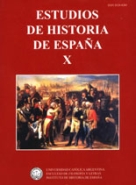El Imperio y las Cortes de Santiago de Compostela de 1520, la base ideológica del Absolutismo español
Palavras-chave:
Comuneros, Imperio, Monarquía, Erasmismo, ConquistaResumo
Our present research relies not only on doctrinal sources but on documents that offer us a glimpse of the social and political reality of the time and of the development of the Imperial ideal. Because of the dinastic change of the House of Habsburg, Castille suffered an upheaval because of the new style of government, which is reflected in this paper. The discovery and conquest of New Spain became an important deterrent to the Bourgundian idea of Empire and was a reason for its adaptation to a Spanish context.Downloads
Downloads
Publicado
2017-02-22
Como Citar
Szászdi, I. (2017). El Imperio y las Cortes de Santiago de Compostela de 1520, la base ideológica del Absolutismo español. Estudios De Historia De España, 10, 165–199. Obtido de https://e-revistas.uca.edu.ar/index.php/EHE/article/view/340
Edição
Secção
Artículos
Licença































